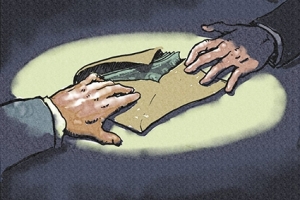IDFI – The Fight against Elite Corruption Remains a Challenge for Georgia
The non-governmental organization Institute for Development of Freedom of Information (IDFI) believes that the fight against elite corruption in Georgia remains a challenge and is calling on the government to create an independent anti-corruption service.
The NGO says that in recent years, media and non-governmental organizations have revealed several cases where possible corruption signs needed additional investigation, but no proper action had been taken or, if it was, society was not informed.
According to the NGO, the facts revealed by them include possible corruption, abuse of power and other cases of civil crime.
However, the IDFI recognizres that there have been cases in recent times when investigations of criminal cases have been launched against various rank officials and they have been convicted.
The report of the State Security Service (SSS) reads that an investigation was begun looking into 62 cases of corruption this year, and 61 persons have been charged in 41 criminal cases. Most of the persons charged with criminal prosecution were employed in local self-government bodies and did not occupy high positions.
According to the IDFI report, the investigation was not directed against any high ranking official of the central government. It is also unknown whether the Prosecutor's Office of Georgia responded to the cases sent to them by the State Audit Office, where, according to the Audit, signs of possible crime were identified.
"In Georgia, the existence of elite corruption as an important challenge is mentioned in the recommendations of authoritative international organizations such as the European Parliament and the Organization for Economic Co-operation and Development (OECD). In particular, one of the articles of the European Parliament's Resolution emphasizes the need for the establishment of an Anti-Corruption Service as an independent agency," reads the statement.
The organization notes that at present, the role of preventing and fighting corruption is distributed among various public agencies in Georgia whose powers and activities are not clearly defined.
"The absence of the investigation of the cases of ‘elite corruption’ during the current and previous governments indicates that it is necessary to reform the existing system because it cannot effectively respond to cases of high levels of corruption, which raises questions in society and negatively impacts public trust towards public institutions,” the NGO stressed.
Zurab Chiaberashvili, member of the parliamentary minority European Georgia says the ruling Georgian Dream (GD) party founder and Chair, Bidzina Ivanishvili, set up a corrupt scheme and clan system after coming to power in 2012.
“IDFI confirmed doubts which have existed in the society for a long time regarding the corruption in the country,” he added.
Roman Gotsiridze, member of the previous ruling party United National Movement also shares the position that high-rank officials are involved in the corruption.
However, the GD team categorically rejects the allegations. According to Tbilisi Mayor, Kakha Kaladze, the IDFI report “means nothing.”
“For me, only the assessments of international organizations are important… Georgia is mentioned among the top countries in terms of doing business and transparency,” the Mayor noted.
Archil Talakvadze, the leader of the GD parliamentary majority, says that no matter who violates the law, everyone will be held responsible.
“In terms of corruption, Georgia’s State Security Service has opened very important cases involving officials. This once again confirms that no one is untouchable in our country,” Talakvadze underlined.
By Thea Morrison











